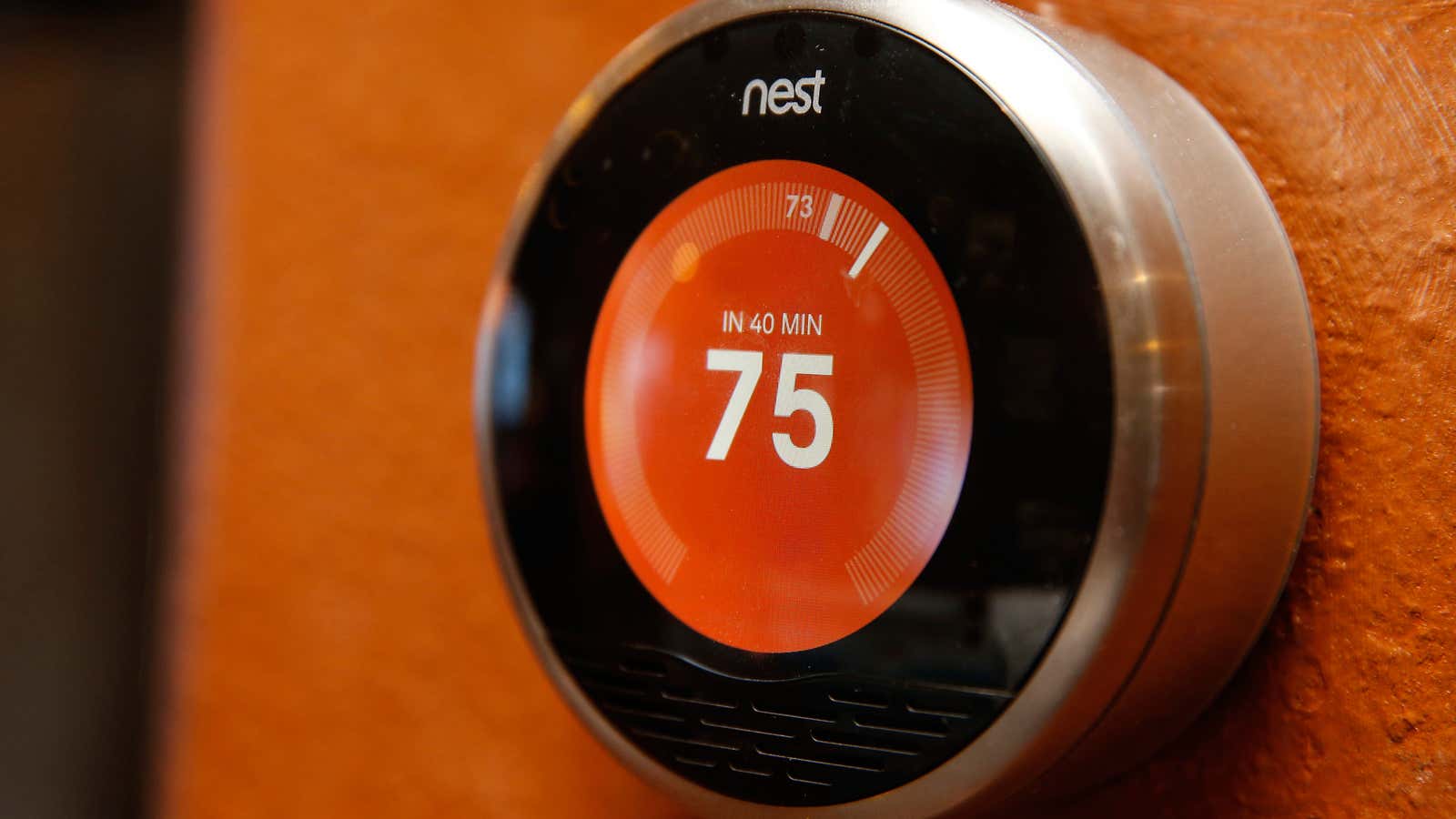My mom recently purchased an internet-connected doorbell, which sounded like a great idea: It has a camera in it so that when someone rings the doorbell, you can see who it is, wherever you are in the world.
But that doorbell turned into an epic and disastrous saga. The first one she bought just plain didn’t work, so the company sent her another one. The second one worked, but then stopped working. Then there was an issue with its Wi-Fi connectivity, and she couldn’t get the doorbell physically off the wall to reset it. The upshot was she had to do without a doorbell for a while, which isn’t exactly ideal for someone that gets packages, has friends, or isn’t a hermit.
Nick Bilton at the New York Times was one of many who had a similarly frustrating problem (paywall) with his Nest thermostat recently, where a glitch drained its battery overnight, causing the house to freeze on a very cold winter night.
And Arlo Gilbert, the CEO of mobile healthcare app Televero, took to Medium this week to voice his fury over his Revolv home automation hub’s impending obsolescence. The Alphabet subsidiary Nest, which purchased Revolv for its developer talent in 2014, will soon end its technical support for the controller and, according to TechCrunch, it will render them useless “bricks” by turning them off completely on May 15.
“That’s a pretty blatant ‘fuck you’ to every person who trusted in them and bought their hardware,” Gilbert said, comparing his soon-to-be-defunct Revolv device to an empty tub of hummus.
Of course, this is always the gamble for the early adopter, that the tech you’ve pined for and spent so much money on could turn out to be a massive dud. But in the past, the biggest risk was some wasted money, and perhaps some much-deserved mocking. Now, however, a bad product could affect your family’s quality of life, and even your home’s security.
At the Consumer Electronics Show in Las Vegas in January, there were internet-of-things versions of just about every appliance or fixture you could find in a home. There were connected faucets, connected stovetops, even connected toilets. A Jetsons-style smart home is a tantalizing prospect, until you stop to think: Do you really want a toilet that doesn’t work because it needs an update to its firmware? And does anyone actually need a connected cup or bike tire? Perhaps we shouldn’t be entrusting basic functions of our houses and lives to technology that just isn’t yet fully realized, made by companies that haven’t proven their viability.
As hardware and software become further intertwined, we rely on the companies that create our devices to continue supporting that technology. And if a company folds or decides to stop investing in ongoing updates and supports, there’s not a lot we can do about it. Early adopters like Gilbert need not despair—the internet of things will always have more gadgets to replace those left by the wayside. When a startup folds, that’s usually because there’s someone doing something similar more successfully, if not better. (Think Spotify, for those who were left wanting after the demise of Rdio.)
But this is not the kind of thinking that we’re used to doing about the investment we make in our stoves, refrigerators, and thermostats. In years past, when you bought an appliance, you used it until it stopped working, you moved, or you wanted to get a newer one.
Now, you can back something on Kickstarter and have an internet-connected knick-knack in your home in a couple months. It’s a far cry from purchasing a stove from GE or a washing machine from Whirlpool—large, old manufacturing companies that spend massive amounts of money each year ensuring their products work and are safe to use in your home. Startups offer no such reassurance, and there’s no guarantee that the company will even be around in two years’ time when you need help with it.
Even Nest, which has the support of one of the richest companies in the world behind it, appears to be struggling to put out quality products. In a now-deleted Reddit post yesterday, a person claiming to be a Nest engineer said the company is “on deathwatch.” “We know how many units are actually being sold, how many subscriptions lapse, how many fail or get returned,” wrote the Reddit poster, who addressed Nest CEO Tony Fadell, and described a “toxic” work environment where people “fall asleep in corners and cry in the bathrooms.” (We have reached out to Alphabet, Nest’s parent company, for comment and will update this post with any response.)
Gilbert complains in his treatise about his Revolv hub that, “Google is intentionally bricking hardware that I own.” Alphabet didn’t immediately respond to our queries as to why it’s choosing to completely disable Revolvs, instead of letting homeowners continue to use it to turn on their lights or lock their internet-connected doors.
As Business Insider suggests, Revolv may have run through Nest’s servers and it just simply didn’t want to support it anymore. But to be fair, the answer may also be about safety: If Nest had continued to allow the Revolv to operate—even though it wasn’t supporting the technology—and then someone’s entire home got hacked through un-patched software, the internet would be complaining that Nest hadn’t done more to stop that happening.
Until there’s a robust, established system for internet-connected devices out there, from a company that doesn’t look set to go bust in a few years, these sorts of problems will continue to pop up. If you want to be on the cutting edge of technology, you have to accept that. Just don’t get upset when you come home and find your light switch isn’t working.
